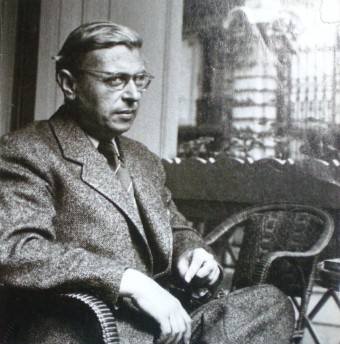This Day in History: October 22nd- The Man Who Refused a Nobel Prize
This Day In History: October 22, 1964
 On October 22, 1964, existentialist author Jean Paul Sartre was awarded the prestigious Nobel Prize for literature, which he chose to decline. His refusal was not an impulsive decision, but rather one based on longstanding personal and objective considerations. Sartre had also turned down the French Legion of Honor, as well as other accolades and honors in the past, so the folks on the Nobel committee were in pretty good company.
On October 22, 1964, existentialist author Jean Paul Sartre was awarded the prestigious Nobel Prize for literature, which he chose to decline. His refusal was not an impulsive decision, but rather one based on longstanding personal and objective considerations. Sartre had also turned down the French Legion of Honor, as well as other accolades and honors in the past, so the folks on the Nobel committee were in pretty good company.
Sartre’s work advanced the philosophy of existentialism – the belief that each person must create meaning in their own life because life itself is essentially meaningless. He was a professor of philosophy in Le Havre, Laon, and Paris, and published his first novel Nausea in 1938. He fought in World War II and later worked with the French Resistance. In 1942, Being and Nothingness was published, which turned out to be his best known work.
In a statement to the Swedish press explaining his rationale for declining the Nobel Prize, Sartre said,
This attitude is based on my conception of the writer’s enterprise. A writer who adopts political, social, or literary positions must act only with the means that are his own—that is, the written word. All the honors he may receive expose his readers to a pressure I do not consider desirable. If I sign myself Jean-Paul Sartre it is not the same thing as if I sign myself Jean-Paul Sartre, Nobel Prize winner.
The writer must therefore refuse to let himself be transformed into an institution, even if this occurs under the most honorable circumstances, as in the present case.
Although very diplomatic in his response in 1964, Sartre let his true feelings be known in the 1976 documentary film Sartre By Himself, where he’s a bit more blunt: “Because I was politically involved the bourgeois establishment wanted to cover up my ‘past errors.’ Now there’s an admission! And so they gave me the Nobel Prize. They ‘pardoned’ me and said I deserved it. It was monstrous!”
Sartre, always an active champion of left-wing social issues, had been pardoned by French President De Gaulle for his part in the 1968 uprisings. “You don’t arrest Voltaire,” De Gaulle supposedly said.
Just the sort of remark that intimated Sartre was an institution, and the very reason he declined to accept the Nobel Prize.
If you liked this article, you might also enjoy our new popular podcast, The BrainFood Show (iTunes, Spotify, Google Play Music, Feed), as well as:
- Alfred Nobel Was Also Known as “The Merchant of Death”
- There is a Parody Set of Nobel Prizes Given Out Annually for Trivial Scientific Achievements, The IG Nobel Prizes
- Nobel Prize Winner Barry J. Marshall in Part Proved What Causes Ulcers by Ingesting the Bacteria He Thought Was Causing Them
- Marie Curie Once Had Two Duels Fought Over Her After An Affair with a Married Man
| Share the Knowledge! |
|





Thanks for an interesting article about a poor soul, one of the saddest, most misguided intelligent men who have ever lived. Speaking of geniuses, Dr. Peter Kreeft, one of the most brilliant men of the 20th/21st Centuries, has written an essay about Sartre, which all of us should now read: http://www.peterkreeft.com/topics-more/pillars_sartre.htm
Did Sartre remain an atheist until he died? There is an unresolved controversy about this, with some having been told a second-hand account of his reversion to the Catholic faith and his deathbed confession (to a Catholic priest). There is also some information here:
atheismexposed.tripod.com/sartre.htm